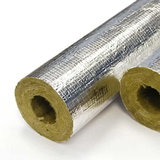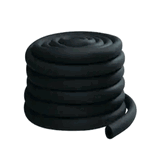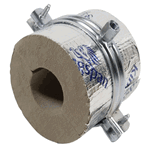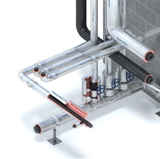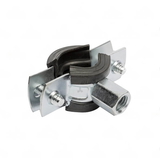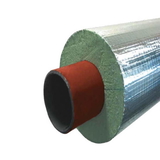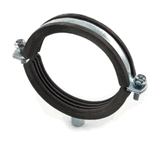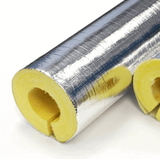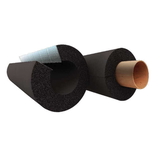- Blogs
- Choosing the Right Pipe Insulation Blocks: A Comprehensive Comparison
Choosing the Right Pipe Insulation Blocks: A Comprehensive Comparison

If you're an M&E installer or specifier dealing with pipework insulation, you'll know the significance of choosing the right pipe insulation blocks. In this guide, we'll explore various types of pipe insulation blocks, their advantages, drawbacks, and the critical factors to consider when selecting the most suitable option for your needs.
Why Use Pipe Insulation Blocks?
Pipe insulation blocks serve a dual purpose: providing thermal insulation and supporting the load where clamps are installed on pipework. Their primary function is to prevent heat loss, condensation, and thermal bridging, while also offering a vapour barrier against moisture, thus safeguarding pipes from corrosion.
Lagging on pipework, in conjunction with insulation blocks, helps sustain insulation integrity, especially where pipe clamps are placed.
Considerations When Selecting Pipe Insulation Blocks
Let's talk about Pipe Insulation Blocks. Usually, their choice is based on the overall insulation required for pipes, how much weight they can handle, and the fire safety needed. Most of the time, M&E installers don't get to choose these blocks themselves. It's the main contractor or mechanical consultant who specifies them, especially now that the industry is prioritising compliance and safety.
Pipe Supports
However, when M&E installers do get to pick the insulation blocks, it's essential not to only consider experience and cost. There are other crucial factors to think about:
- How much insulation is needed?
- Can it handle weight well?
- Is it fire-resistant?
- Where will it be installed? Environmental factors matter.
- Is it recyclable or eco-friendly?
The pipe material and what goes through it, like the temperature and volume of its contents, can also affect these factors.
There's more to think about too. Do the blocks come with coverings? Many have an outer foil layer for extra vapour protection. Also, how thick should the insulation blocks be to maintain the needed insulation around the pipe clamp? Often, as pipe sizes increase, the insulation thickness and load-bearing needs go up too. Sometimes, for blocks with lower compressive strength, using split shells can add more protection. The type of clamp used also plays a role here.
Types of Pipe Insulation Blocks
Hardwood Blocks:
Let's talk about hardwood blocks. They've been around for quite some time and have been doing their job well, but when it comes to conducting heat, they're not the best - only 0.1W/mK. In fact, BS 5970 advises against using them due to their poor insulation properties. Plus, they're not fire-resistant, which has become a bigger concern lately. However, they're tough cookies and still get specified for projects because of their strength. According to BS 5970, they should only be used when there's proof that other insulation blocks can't handle the load requirements.
You can get these blocks in different thicknesses: 15mm, 20mm, 25mm, 30m, 35mm, 40mm, and 50m.
Advantages of Hardwood Blocks:
- They're affordable.
- Strong enough to bear heavy loads.
- Sturdy, making them easy to store and transport.
Disadvantages of Hardwood Blocks:
- Insulation isn't up to expected standards.
- They're not fire-resistant.
Phenolic Blocks:
 Phenolic blocks are made from sturdy phenolic foam that's great at insulating - just 0.021W/mK, which means they're fantastic for keeping heat in or out. That's good news for systems that need to maintain a specific temperature, whether it's heating or cooling. They can handle Low Temperature, Hot Water (LTHW), and Chilled Water Systems (CHW) pipes ranging from -50°C to 110°C.
Phenolic blocks are made from sturdy phenolic foam that's great at insulating - just 0.021W/mK, which means they're fantastic for keeping heat in or out. That's good news for systems that need to maintain a specific temperature, whether it's heating or cooling. They can handle Low Temperature, Hot Water (LTHW), and Chilled Water Systems (CHW) pipes ranging from -50°C to 110°C.
They're not the cheapest, but they're not overly expensive either. These blocks can take a good amount of weight, with a density of 35-40 kg/m3. Now, even though phenolic foam can burn, these blocks have a fire classification of BL-S1, d0, which is a big improvement from hardwood blocks. They come with a foil finish that acts as a built-in vapour barrier. You can find them in various thicknesses, starting from 15mm and going up to 50mm, and you can even order larger sizes if needed.
Advantages of Phenolic Blocks:
- Superb insulation at a reasonable price.
- Suitable for handling LTWH systems according to BS EN ISO 10211: 2007.
Disadvantages of Phenolic Blocks:
- Not as fire-resistant as Rockwool blocks.
- Requires careful handling to avoid damage.
Rockwool Blocks:
Rockwool blocks are crafted from dense mineral wool that's super tough and won't catch fire. They can handle a wide range of temperatures, from 0 to 250°C, which makes them a go-to choice for various piping systems - Low-Temperature Hot Water (LTHW), Chilled Water (CHW), and even High-Temperature Hot Water (HTHW) systems. These blocks have an A2 rating for fire reactions, meaning they're pretty fire-resistant. But remember, they're not meant for use in freezing temperatures.
To keep things sealed tight, they come with a foil finish that acts as a built-in vapour barrier. In terms of keeping the heat in or out, they're moderately good, with a thermal insulation rating of around 0.049W/mK. You'll find them in different thicknesses, starting from 20mm and going up to 50mm.
Advantages of Rockwool Blocks:
- Fireproof and gets an A2 rating for fire reactions.
- Handles hot pipes up to 250°C like a champ.
- Rockwool is around 97% recyclable.
Disadvantages of Rockwool Blocks:
- One of the pricier options available.
- Not as thermally efficient as Phenolic blocks.
- Won't do well in sub-zero temperatures.
Armacell Blocks:
Armacell blocks known as ArmaFix Ecolight Blocks, are something special. They're created from 100% recycled PET plastic bottles and can handle a fair bit of weight, with a density of 95-105kg/m3. What's impressive about these blocks is their combination of low thermal conductivity (0.033W/mK) and excellent resistance against water vapour.
Unlike Rockwool, Phenolic, or Foamglas blocks, they don't need an extra foil layer on the outside for vapour control. They're suitable for systems like Low Temperature Hot Water (LTHW) and Chilled Water (CHW) within temperatures of 0 - 80°C. These blocks are rated Euroclass E for reaction to fire under EN 13501-1.
You'll find them in various thicknesses - 13mm, 19mm, and 25mm.
Advantages of Armacell Blocks:
- Fantastic at keeping heat in and resisting water vapour.
- Completely made from recycled materials.
Disadvantages of Armacell Blocks:
- Pricier, just like Rockwool.
- Not as good with high pipe temperatures and fire resistance as Rockwool.
- Limited availability in terms of thickness, maxing out at 25mm.
Foamglas Blocks:
Let's explore Foamglas blocks. These are crafted from Cellular Glass, which is a lightweight material but super tough and long-lasting. The magic lies in the millions of sealed glass cells that make them up. They're seriously strong, with a density of 165kg/m3, and won't catch fire, being non-combustible.
Foamglas blocks are perfect for systems like Low-Temperature Hot Water (LTHW), Chilled Water (CHW), and High-Temperature Hot Water (HTHW), and can handle a wide temperature range from -260 to 430°C. To keep everything tightly sealed, they come with a foil finish that acts as a built-in vapour barrier.
In terms of insulation, they do a decent job with a thermal insulation rating of 0.048W/mK. You can find them in various thicknesses ranging from 20mm to 50mm.
Let's take a closer look at the advantages and drawbacks:
Advantages of Foamglas Blocks:
- Fireproof and doesn't burn.
- Handles an impressive temperature range from -260 to 430°C.
- Crazy strong and can take a lot of pressure.
Disadvantages of Foamglas Blocks:
- Not as good at insulation as Phenolic blocks.
- Availability might be limited for standard pipe sizes.
Calcium Blocks:
Let's talk about calcium blocks. These are made from calcium silicate, which does a great job at keeping heat in on hot process applications, with a thermal efficiency of 0.07W/mK. These blocks can handle Low-Temperature Hot Water (LTHW), Chilled Water (CHW), and High-Temperature Hot Water (HTHW) systems, boasting an incredible temperature resistance of up to 1050°C. Plus, they're non-combustible and super tough, with a density of 265kg/m3. You can find them in different thicknesses, starting from 20mm and going up to 40mm, and even larger sizes are available upon request.
Advantages of Calcium Blocks:
- Doesn't catch fire, making it non-combustible.
- Handles high temperatures like a champ, up to 1050°C.
- Strong and can take a lot of pressure.
Disadvantages of Calcium Blocks:
- Not as good at insulating heat as some others (except for Hardwood blocks).
- Availability might be an issue for standard pipe sizes.
- Requires careful handling to prevent damage.
Which Pipe Insulation Block is Best?
The best pipe insulation block depends on various factors, including the pipe type, contents, required insulation level, compressive strength, fire resistance, and installation environment. Each type has its strengths and limitations, making the selection contingent on the specific application.
Before making a final decision, it's crucial to review technical data to ensure the chosen block aligns with the specific requirements.
In conclusion, the evolution of pipe insulation blocks has provided diverse options catering to different needs and specifications. Choosing the right one involves careful consideration of all the variables mentioned to ensure optimal performance and efficiency.
For a comprehensive range of pipe insulation blocks, explore our collection at Buy Insulation Online and make an informed choice for your insulation needs.
Conclusion
In conclusion, selecting the right pipe insulation blocks is a critical decision influenced by various factors such as thermal efficiency, load-bearing capacity, fire resistance, and environmental suitability. This comprehensive comparison of pipe insulation blocks, including hardwood, phenolic, Rockwool, Armacell, Foamglas, and calcium variants, highlights their distinct advantages and drawbacks. The optimal choice hinges on the specific application requirements, encompassing pipe type, content, insulation needs, and installation context.
By scrutinizing technical specifications and considering the unique demands of each project, stakeholders can make informed decisions to ensure maximum performance and efficiency. The diverse array of pipe insulation blocks available in today's market caters to a wide spectrum of needs, offering an opportunity for meticulous consideration and selection to meet varied specifications in the mechanical and engineering domain.
For a curated selection of pipe insulation blocks, buyers can explore the comprehensive range available at Buy Insulation Online to make well-informed choices tailored to their insulation necessities.

Samuel Hitch
Managing Director
Buy Insulation Online.
Leave A Reply
Your feedback is greatly appreciated, please comment on our content below. Your email address will not be published. Required fields are marked *
